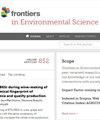吉林省生态环境质量的时空变化及影响因素(中国)
IF 3.3
3区 环境科学与生态学
Q2 ENVIRONMENTAL SCIENCES
引用次数: 0
摘要
吉林省是中国农业和林业发展的重要地区。其生态环境的恶化会对农业生产和生态保护造成严重影响。系统地评估吉林省的生态环境质量对其可持续发展至关重要。在本研究中,我们利用 1990 年至 2020 年(每 5 年一次)的 Landsat 数据构建了吉林省的遥感生态指数(RSEI)。我们采用森氏斜率估计器和 Mann-Kendall 趋势检验来研究 30 年间生态环境质量的时空变化。此外,我们还利用地理探测器探讨了影响生态环境质量的社会经济和自然因素。结果显示1)从 1990 年到 2020 年,吉林省平均 RSEI 指数在 0.586 到 0.699 之间,表明生态环境质量总体良好。从空间上看,生态环境质量由东向西逐渐下降。2) 吉林省的 RSEI 呈先上升、后下降、再上升的趋势。这种改善可归因于政府政策的实施,扭转了盐碱地扩张的趋势。30 年间,吉林省西部地区的生态环境质量明显改善。3) 社会经济因素和自然因素都会影响吉林省的生态环境质量。其中,植被覆盖率对研究区生态环境质量的影响最为显著,自然因素的影响比社会经济因素更为显著。我们的研究可为吉林省的政策制定提供相关数据支持。本文章由计算机程序翻译,如有差异,请以英文原文为准。
Spatial-temporal variation and influencing factors of ecological environment quality in Jilin Province (China)
Jilin Province is a crucial region of interest for agricultural and forestry development in China. The deterioration of its ecological environment could have a severe impact on agricultural production and ecological conservation. A systematic assessment of ecological environment quality in Jilin Province is essential for its sustainable development. In this study, we utilized Landsat data from 1990 to 2020 (every 5 years) to construct the Remote Sensing Ecological Index (RSEI) for Jilin Province. We applied the Sen’s slope estimator and the Mann-Kendall trend test to examine the spatiotemporal changes in ecological environment quality over a 30-year period. Additionally, we employed the Geo-detector to explore the socioeconomic and natural factors influencing ecological environment quality. The results revealed: 1) From 1990 to 2020, the average RSEI index in Jilin Province ranged from 0.586 to 0.699, indicating overall good ecological environment quality. Spatially, ecological environment quality gradually declined from east to west. 2) The RSEI in Jilin Province exhibited an initial increase, followed by a decrease, and then another increase trend. This improvement can be attributed to the implementation of government policies, which reversed the expansion of saline-alkali land. Ecological environment quality significantly improved in the western region of Jilin Province over the 30-year period. 3) Socioeconomic and natural factors both influence ecological environment quality in Jilin Province. Among these factors, vegetation coverage has the most significant impact on the ecological environment quality in the study area, with natural factors exerting a more significant influence than socioeconomic factors. Our research can provide relevant data support for policy-making in Jilin Province.
求助全文
通过发布文献求助,成功后即可免费获取论文全文。
去求助
来源期刊

Frontiers in Environmental Science
Environmental Science-General Environmental Science
CiteScore
4.50
自引率
8.70%
发文量
2276
审稿时长
12 weeks
期刊介绍:
Our natural world is experiencing a state of rapid change unprecedented in the presence of humans. The changes affect virtually all physical, chemical and biological systems on Earth. The interaction of these systems leads to tipping points, feedbacks and amplification of effects. In virtually all cases, the causes of environmental change can be traced to human activity through either direct interventions as a consequence of pollution, or through global warming from greenhouse case emissions. Well-formulated and internationally-relevant policies to mitigate the change, or adapt to the consequences, that will ensure our ability to thrive in the coming decades are badly needed. Without proper understanding of the processes involved, and deep understanding of the likely impacts of bad decisions or inaction, the security of food, water and energy is a risk. Left unchecked shortages of these basic commodities will lead to migration, global geopolitical tension and conflict. This represents the major challenge of our time. We are the first generation to appreciate the problem and we will be judged in future by our ability to determine and take the action necessary. Appropriate knowledge of the condition of our natural world, appreciation of the changes occurring, and predictions of how the future will develop are requisite to the definition and implementation of solutions.
Frontiers in Environmental Science publishes research at the cutting edge of knowledge of our natural world and its various intersections with society. It bridges between the identification and measurement of change, comprehension of the processes responsible, and the measures needed to reduce their impact. Its aim is to assist the formulation of policies, by offering sound scientific evidence on environmental science, that will lead to a more inhabitable and sustainable world for the generations to come.
 求助内容:
求助内容: 应助结果提醒方式:
应助结果提醒方式:


